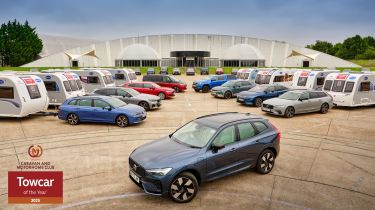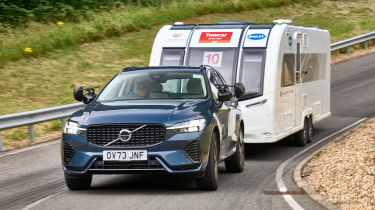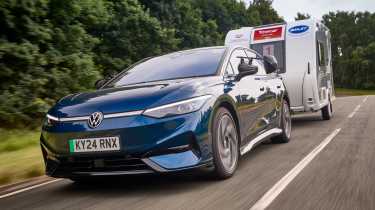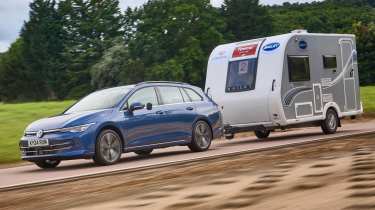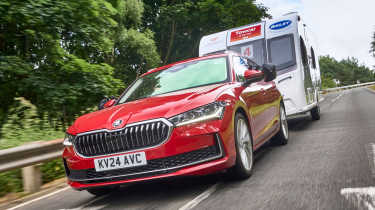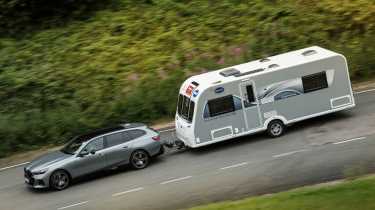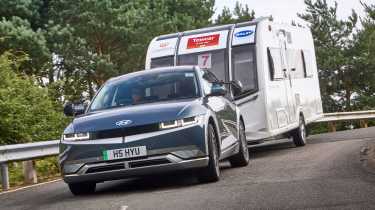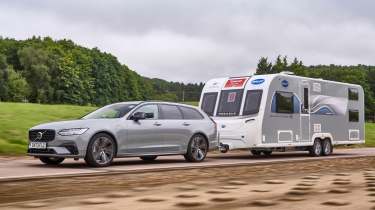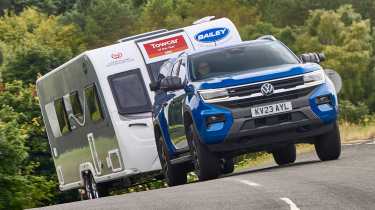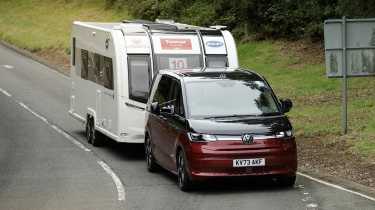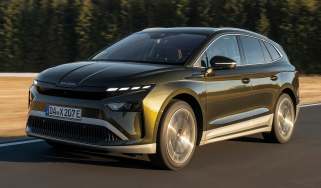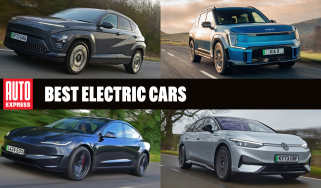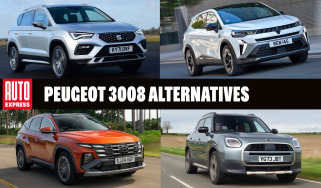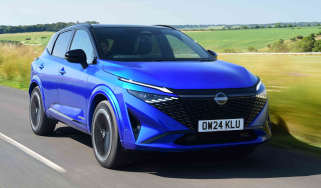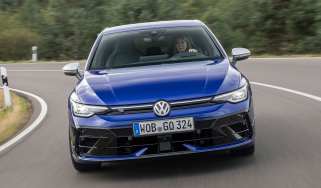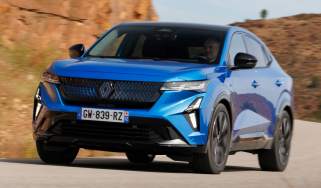Best tow cars to buy 2025
There’s more to towing a car than just hitching up a caravan. Check out these tow car stars to pick what’s right for you
The coveted Caravan and Motorhome Club (CAMC) Towcar of the Year awards are now firmly established as the United Kingdom’s longest running and most widely respected towing contest.
The test plays out each year at the UTAC Millbrook proving ground in Bedfordshire, where Auto Express is part of the judging team evaluating the driving performance of all the contenders. The tests are carried out with vehicles hitched up to caravans weighted to 85 per cent of each car’s kerbweight, or to its maximum towing capacity if lower, as per established CAMC safety guidance.
The driving element includes circuits of the Millbrook Alpine Route, which has a gradient of up to 17 per cent – where a hill start is performed – followed by a brake test on a 26 per cent downhill gradient. Towing combinations are assessed for their performance under acceleration when joining fast traffic from a standstill, while Millbrook’s banked bowl circuit affords judges the chance to see how towcars perform at speeds beyond the 60mph motorway limit.
Inducing instability in the safe environment of a test track lets the judges assess and compare how towing combinations react at the limits, providing insights that could be vital for potential purchasers. Vehicles are also assessed for their reversing performance by the driving team, along with driver and passenger comfort and visibility.
The CAMC team also does measured braking and acceleration tests while towing, and each car’s practicality is tested by seeing how easily it swallows the bulky accessories caravanners use.
The depth of analysis and insight produces results that are eagerly awaited by the CAMC’s one million-plus members, as well as anyone who is considering purchasing a vehicle with towing in mind. So read on for our verdict on this year’s category champions.
Volvo XC60 T6 Plug-in Hybrid AWD Plus
Class winner: Overall Towcar of the Year 2025
Class winner: Caravan Weight Over 1,800kg
Class winner: Best hybrid tow car
Class winner: Best family tow car
That the overall 2025 Towcar of the Year has to be a vehicle of many talents is ably demonstrated by the fact that the top dog was also named the winner of the competition’s 1,800kg weight category, best Family Towcar category and best Hybrid Towcar class.
It’s some record for Volvo’s second- generation XC60 SUV – a car that first appeared in 2017, but which has been kept usefully updated and refreshed over the years to remain at the top of its game today.
Looks have never been a problem for the elegant XC60, which is blessed with design features inside and out that give it a cool, contemporary and modern ambience. That suave image crosses over to the Volvo’s dynamic performance, which has always been tilted more towards refinement, relaxation and comfort than any sporting pretension. That’s in spite of some significantly powerful engine options, which are all based around the same 2.0-litre four-cylinder unit.
It’s a character that lends itself perfectly to towing, with this latest version of the XC60 outperforming all of its rivals to clinch the richly deserved title of Towcar of the Year. On the dynamic front, boasting 345bhp and all-wheel drive, exceptional refinement and laudable stability, the T6 plug-in hybrid aced all the challenges the competition throws up. Unflappable on the twisting hill route, and breezily capable on the hill-start tests, the XC60 backed it all up with impeccable high-speed cruising manners and was relaxed and reassuring at all times.
Factor in a spacious SUV body with acres of room for the all the family and a decently sized - if admittedly not class-leading - boot, as well as the Volvo’s excellent material quality, fit and finish, matched to premium levels of refinement and comfort, and it’s easy to see what an excellent all-rounder the Swedish brand has created for individuals or families who place towing high on the agenda. It’s a truly worthy winner of this coveted award.
Volkswagen ID.7 77kWh 286PS Match Pro
Class winner: Caravan Weight Up to 1,200kg
It used to be said that a large, heavy car was exactly what you needed to handle a big tow, but the arrival of certain electric cars has upset the logic of that statement.
Last year Volkswagen’s ID. Buzz made a significant impact in the Towcar of the Year contest. The German vehicle swept the board in the CAMC awards’ entry-level towing weight category, where, in spite of its size and bulk, its low 1,000kg towing limit meant the ID. Buzz was competing against relative minnows.
There are now more powerful ID. Buzz variants in the range with towing limits up to a more satisfying 1,800kg for the GTX four-wheel-drive model. The same can also be said for this year’s sub-1,200kg category winner, because the ID.7 shares a common platform with its ID. Buzz stablemate that took the honours in 2023.
However, while ID.7 models such as the twin-motor four-wheel-drive GTX are available that will tow up to 1,800kg, VW sagely entered its entry-level Pro Match version in the contest instead, where the 1,200kg towing limit once again made the brand’s category challenger a big fish in a little towing pond.
While it only has rear-wheel drive, the ID.7’s significant 2,120kg bulk and 282bhp of smooth electric power meant that it made light work of the towing challenge, while also confidently outperforming last year’s category winner, not least thanks to the extra power available.
Despite this not seeming an overly impressive feat for such a big car to win the smallest towing weight category, there’s no doubt anyone wanting to use the ID.7 for light towing work will be well served by VW’s flagship electric car.
The model combines strong performance with limousine-like interior space, while features such as laminated side windows increase the already high level of refinement that you would expect from an all-electric powertrain.
What the judges said: The Volkswagen ID.7 77kWh 286PS Match Pro easily took the category win. It came out on top on account of its spacious interior, huge boot and beautifully supple ride. Depending on trim, the ID.7 can travel impressive distances on one charge; VW claims up to 436 miles when it’s unhitched.
Volkswagen Golf Estate 1.5 eTSI 150PS DSG Style
Class winner: Caravan Weight 1,200kg-1,300kg
Just to prove Volkswagen can compete at the lighter end of the towing game without rolling out a heavyweight EV to steam-roller any competition, enter that evergreen family-car favourite – the Golf Estate.
And it’s not even a torquey diesel model, which would once have ruled the roost from a towing perspective, because the 1.5 eTSI’s mild-hybrid technology ensures there’s plenty of pulling power even from low revs. This petrol-powered Golf puts the power down admirably, too, in spite of its front-wheel-drive configuration, and we were certainly impressed with its performance under load on the test’s challenging hill starts.
It’s not just the dynamics that impress, though, because the Golf’s roomy estate body also makes for supremely practical family transport. Compared with many of its more fashionable SUV-style rivals, the VW also excels when it comes to all round visibility, itself a significant factor when you’re towing a caravan.
Drivers will also benefit from the impressive refinement, not to mention the formidable build quality, which helps to give the Golf something of a bigger car feel. The estate had a facelift early in 2024, too, when it received up-to-date LED headlights, an illuminated grille badge and revised rear-light designs. More significantly, following much criticism around the pre-facelift car’s control set-up, the latest model has physical steering-wheel buttons, and a touch-control ‘slider’ that’s illuminated to aid adjusting volume and climate functions, although you’d probably still prefer an old-fashioned rotary dial.
There’s less room for argument when it comes to the Golf Estate’s cargo-hauling ability, though. It has an extremely roomy boot that will swallow 611 litres of luggage with the rear seats still in use, and 1,642 litres if you fold them down.
What the judges said: The Golf has long been the default choice for those who want a well engineered car with timeless styling and a high-quality, practical interior. The judges liked the Golf’s nimble handling, comfortable ride, responsive mild-hybrid engine and simply enormous boot.
Skoda Superb Estate 1.5 TSI e-TEC 150PS DSG
Class winner: Caravan Weight 1,300kg-1,500kg
It shares a powertrain with the smaller Golf Estate that wins the 1,200-1,300kg weight category, so it shouldn’t come as
a total surprise that the highly regarded load-hauling Skoda Superb Estate cleans up here.
But the Skoda is a significantly bigger car, so the 1.5 e-TEC (as it’s billed in the brand’s line-up) has more work to do. In our road-test reviews, we’ve wondered whether this entry-level engine in the Superb might not become overwhelmed when the car is fully laden. But our tests over Millbrook’s challenging hill route suggest this economical and refined powertrain certainly suits the more measured driving approach required when hitched to a caravan.
With only two-wheel drive, there was no indication of the Superb struggling for power or traction on the hill-starts either, suggesting the mild-hybrid’s electric motor could be playing a big part in ‘filling in’ the torque curve at lower revs. The DSG automated gearbox also performed repeated hill-starts with no evident ill-effects.
A relatively long wheelbase and low centre of gravity – certainly compared with some of the SUVs on test – ensure the Skoda tracks beautifully with a caravan in tow, and its excellent refinement and impressive amount of space for passengers mean you’ll reach your destination relaxed in body and mind. Drivers certainly get plenty of feel-good factor from the car’s standard tech, too, which includes a 10.25 inch Virtual Cockpit dashboard display and a 13-inch touchscreen, while still featuring pleasingly straightforward rotary knobs for the climate controls.
And we haven’t even mentioned the Superb Estate’s trump card yet, which is its phenomenal load space that will swallow even the best-equipped camper’s clobber with ease. The manufacturer’s official figures quote 690 litres of boot space with the seats up, rising to 1,920 litres with them folded.
What the judges said: Skoda’s Superb has long been a CAMC Towcar of the Year favourite. The latest version has only just arrived in the UK and it boasts a larger interior plus a new look. In SE L guise, the judges liked its smooth and quiet driving manners, rear legroom and enormous boot. The 1.5-litre mild-hybrid petrol engine provides good all-round performance and fuel economy. Judges loved the car’s stability at low and high speeds, and great rear visibility when reversing a caravan.
BMW i5 eDrive40 M Sport Pro Touring
Class winner: Caravan Weight 1,500kg-1,600kg
Class winner: Best Luxury Towcar
Class winner: Best Electric Towcar
While towing traditionalists will cast appreciative nods towards the petrol-powered Skoda Superb Estate and pine for a good old-fashioned diesel, we reckon even the most cynical members of the anti-EV brigade would struggle to really pick fault with the stonkingly strong performance of this latest BMW i5 Touring model. It hasn’t only clinched its weight category, but the judges named it best Luxury Towcar and best Electric Towcar to boot.
The i5 eDrive isn’t just a good car, it’s a great one, and anyone who gets behind the wheel is likely to be immediately seduced by the German model’s combination of design, handling, space, refinement and efficiency. It’s currently a pretty unique proposition, too, because it’s the only fully electric executive estate car on the market.
But while it’s a terrific vehicle to tow with, we have to acknowledge that anyone who might previously have enjoyed the 500-mile-plus range of a 5 Series diesel will think hard about whether this electric exec is right for them. Yet if, like many people, your towing habits are typically confined to regular weekend trips to a favourite caravanning or boating spot that’s not too far away, the i5 Touring can make a lot of sense.
As with its 5 Series counterparts - which are petrol only these days, because BMW has ditched diesel power - the i5 Touring boasts a huge 570-litre boot that increases to 1,700 litres with the seats folded. The car also offers plenty of interior space for passengers, with lots of knee and headroom for those sat in the back.
Dynamically, the model feels potent and very much the ‘traditional’ BMW, with 335bhp and 430Nm directed to the back wheels. Unhitched, that makes for a swift 6.1 second 0-62mph time or when towing it makes light work of the load. Light steering and an agile feel mean the i5 is as rewarding as it is capable, while if you’re in the mood for calmly cruising, the BMW is impressively hushed at almost any speed.
What the judges said: The 5 Series Touring has traditionally been a great towcar and the brand- new electric version (the first-ever electric 5 Series) keeps up that reputation. It’s a luxurious estate with a fine blend of desirable features that bowled over the judges. BMW’s latest interiors offer outstanding tech and fantastic build quality, while there’s lots of space in the back seats and boot. Engaging handling just sealed the deal. It also took the Electric Towcar and Luxury Towcar category wins for its fantastic drive, a claimed 324-mile range from its 81.2kWh battery and plush feel.
Hyundai Ioniq 5 77.4kWh 328PS AWD Ultimate
Class winner: Caravan Weight 1,600kg-1,700kg
The Hyundai Ioniq 5 is Marmite from a styling perspective, but it’s long been one of our favourite EVs, thanks to its roomy, well appointed cabin and excellent powertrain performance. The Korean company rolled out its potent 324bhp twin-motor edition to take on rivals in the 1,600-1,700kg towing category, and when its scores were totted up, a combination of appealing attributes saw it beat the Skoda Kodiaq 2.0 TDI 4x4 to the class win – which was an eye-opener for some judges.
The Ioniq 5’s significant low-down weight, combined with smooth all-wheel-drive power delivery via motors on each axle that maximise traction, meant it handled its towing chores with ease - even if the car is less entertaining to drive when unhitched than the BMW i5, which sits in the towing class below.
While electric towing still won’t work for everyone, the Ioniq 5 has an advantage over some rivals in that it’s set up to handle 350kW charging, where available. So while you might have to unhitch your tow to top up at the motorway services, you shouldn’t have to linger too long, with a 10-80 per cent charge time of less than 20 minutes.
Hyundai won this class with an Ioniq 5 in Ultimate trim, which is lavishly equipped for a mid-range model. The list of kit includes 20-inch alloy wheels, electrically heated and cooled seats, a head-up display and impressive seven- speaker Bose stereo. The Ioniq 5 also makes full use of its not inconspicuous size with a vastly spacious cabin that really pampers occupants, while big windows and light interior fabrics give a bright, modern and airy feel.
The hatchback rear end isn’t quite as generous as some rivals, with the 527-litre boot being wide but a little shallow, yet if you fold the seats down there’s 1,587 litres available. If you need to keep the seats raised, there’s a fore/aft slider to maximise legroom or boot space as you see fit.
What the judges said: Another electric car taking class honours, the Hyundai Ioniq 5 really impressed the judging panel. In 77.4kWh all-wheel-drive form, the vehicle was praised for its performance, super-fast charging capability, looks, driving range, spacious interior and refined drive. It’s a deceptively large car, and 2025 model year vehicles will get a larger 82kWh battery pack for a longer range.
Volvo V90 T8 Plug-in Hybrid AWD Ultra
Class winner: Caravan Weight 1,700kg-1,800kg
Terrific towing credentials aside, the Volvo V90 offers superior cruising refinement and a comfortable interior, with a truly luxurious ambience and fine finish. This perhaps sets it apart from some of its more- focused Volvo estate forebears, which were more utilitarian. Still, that’s not a problem for us, because the V90 remains a genuinely practical choice that has a bit more style and panache than Volvo estate owners of the past might have become accustomed to.
The T8 category winner is the more powerful of a pair of plug-in hybrids that Volvo offers, and both share a 50kW battery, so you can commute for pennies on weekdays. Come the weekend when it’s time to tow, the T8’s powerful 2.0-litre petrol engine has what it takes to handle a sizeable caravan even if your battery is spent. That’s not a bad compromise if you’re looking to minimise your environmental footprint when possible, but need to take a more pragmatic view when appropriate.
Our category winner was in Ultra trim, which provides a serious amount of kit for the money. The highlights include a 19-speaker Bowers & Wilkins audio system, adaptive suspension, LED-matrix headlamps, panoramic roof and 20-inch alloys, on top of the Plus trim’s 360-degree cameras and front and rear heated seats, to name a few. While it’s pricey, at £67,500, that’s not much more than you’d pay for a plug-in hybrid Mercedes E-Class Estate in entry-level trim.
But for all that, it’s still a Volvo estate, so you want to know about the boot space. And while the V90 is by no means a class leader, it still has what it takes to cope with the average family’s demands and more. The swoopy rear end means it gives significant ground to the Mercedes E-Class and BMW 5 Series Touring, but who’s going to really grumble at 551 litres with seats up or 1,517 litres with them down?
What the judges said: Volvo took the sad decision to remove its estate cars from the UK in August 2023, citing falling demand for load- luggers. But now the V60 and the larger V90 are back– and it’s great news because Volvo estates have always made great towcars. The V90 only comes with plug-in hybrid power, and that means smooth performance even when the battery is depleted. It’s a great choice that tows confidently and has a fantastically practical interior layout.
Volkswagen Amarok 3.0 TDI 4MOTION 240PS PanAmericana
Class winner: Best Pick-up Truck
A mix of 4MOTION four-wheel drive and a punchy 3.0 V6 with a smooth-shifting 10-speed automatic transmission are a great starting point for a towcar – or in this case a towing pick-up. And the Volkswagen Amarok certainly adds the necessary degree of comfort and refinement for anyone who wants to drive one for leisure and not just for work.
The model that clinched the best pick-up towcar prize is the PanAmericana derivative, which sports stealthy features such as black 18-inch diamond-cut alloy wheels and exterior trim, as well as roof rails and an X-themed grille. It also has a special comfort-focused suspension set-up, while inside its lavish spec includes full-leather upholstery, plus a top-notch Harman Kardon audio set-up.
That’s all on top of the kit fitted to lesser Amaroks, which includes a full package of driver-assistance aids, parking sensors and cameras, LED-matrix lamps and more. Yes, the Amarok costs more than some of its rivals, but none can match it for upmarket feel – and that includes the Ford Ranger, which shares many of its parts, thanks to an ongoing Ford and VW joint venture.
The Amarok’s lifestyle focus is further revealed by the fact that it only comes as a four-door ‘double cab’, while others in the sector are available with more utilitarian two-door cabs. That said, the striking VW could hardly be described as work-shy, thanks to a huge cargo bay that’s easily big enough to swallow large loads should you need it.
When towing, the Amarok’s hefty 600Nm of torque meant it was barely troubled by a large caravan on the back, while traction was flawless on the challenging hill starts. The view over the bonnet and all around is pretty good, too, but the Amarok’s imposing bulk means it might be a challenge if your caravanning trips include jaunts down narrow country lanes.
Then again, if you want to tow a big van, you need a big vehicle to pull it.
What the judges said: Some drivers want a workhorse during the week and a vehicle that can easily haul a caravan at weekends and over summer holidays – and the Volkswagen Amarok is the perfect answer. It’s closely related to the Ford Ranger, but the Amarok has that certain something extra. Its upmarket looks and interior show pick-ups don’t have to be unrefined and agricultural. It is hugely capable off road and tows with serious competency.
Volkswagen Multivan 2.0 TDI 150PS DSG Style
Class winner: Best Large Family Towcar
The current Volkswagen Multivan appeals to the near cult-like following that the brand’s iconic air-cooled campervans kicked off, and which subsequently spread to seemingly anything van-shaped with a VW badge on the front. Luckily, this is not a case of style over substance, because the Multivan is a refined and comfortable form of transport for families. It has up to seven seats, all of which can be individually removed or slid back and forth on rails to create your ideal layout.
In fact, as you’d probably expect due to its size, there’s little to touch the Multivan when it comes to accommodating a family and all its gear. From the electrically operated tailgate and sliding doors, to a cavernous interior that will swallow
up to 3,672 litres of luggage with the rear seats removed, it’s got all the bases covered. It’s not just for the big stuff, either, because the cabin also features twin gloveboxes, three front-door storage pockets and dash-top stowage for all your road-trip essentials.
With economical 2.0 TDI diesel power, the Multivan also has lots of grunt for towing, while a DSG semi-auto gearbox operated by a toggle switch on the dashboard means it’s almost as easy to drive as an EV. You sit up high with a commanding view of the road ahead, too, which is something to be enjoyed by all passengers thanks to the big glasshouse. The Multivan is essentially pretty car-like to drive, and certainly easy to place on the road.
We found plenty of traction while hitched up, which was especially valued on hill starts, while the Multivan feels very stable at cruising speed with a caravan in tow. This makes it a relaxing and comfortable vehicle in which to embark on caravanning adventures or other trailer-towing pursuits. The ride isn’t as compliant as a true passenger car, and can be a little jiggly, but the Multivan’s steering is decently responsive and it’s engaging to drive.
What the judges said: This is the third year running that the Multivan has walked off with a Large Family Towcar win, and it’s easy to see why. It’s a great vehicle that is easy to drive and park, well mannered on different road types and simply enormous inside. The interior can be configured in various ways to further boost flexibility, too. The 148bhp 2.0 litre diesel is a good engine. If you need space, the Mulitivan can’t be beaten.

